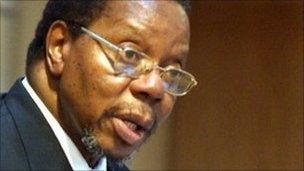UK and Malawi in tit-for-tat diplomatic expulsions
- Published

Bingu wa Mutharika recently purchased a presidential jet
The UK has ordered Malawi's high commissioner to leave the country over the "unacceptable" expulsion of Britain's envoy to Lilongwe.
Fergus Cochrane-Dyet was told to leave Malawi after he was quoted in a leaked cable as saying the president does not tolerate criticism.
A British diplomat warned of "serious consequences", according to an internal memo seen by the BBC.
Some 40% of Malawi's budget comes from abroad. The UK is the largest donor.
An invitation to the Malawian government to a party at the high commission to celebrate the royal wedding on Friday has been withdrawn.
According to the diplomatic cable published by the local Weekend Nation newspaper last week, external, Mr Cochrane-Dyet described Malawi's President Bingu wa Mutharika as "becoming ever more autocratic and intolerant of criticism".
He said local civil society activists were afraid after a campaign of threatening phone calls and said the government was restricting the freedom of the media and minorities.
Under pressure from donors, Mr Mutharika last year pardoned two gay men who had been jailed because of their relationship, which is illegal in Malawi.
Poor to suffer?
Following Mr Cochrane-Dyet's expulsion, British Foreign Secretary William Hague said: "It is a worrying sign that the Malawian government is expending its energies in this way, rather than focusing on the real and substantial challenges facing it, including the need for improved governance."
He said acting High Commissioner of Malawi Flossie Gomile-Chidyaonga and her dependants must leave the UK at "the earliest opportunity" and hinted that the UK's aid to its former colony could be cut.
"I have also asked my officials, working closely with their colleagues elsewhere in government, to review rapidly the full range of our wider relationship with Malawi."
The EU office in Malawi has also condemned the decision to expel Mr Cochrane-Dyet.
Malawi is one of the poorest countries in the world, with an estimated 75% of the population living on less than $1 (60p) a day.
In the leaked cable, Mr Cochrane-Dyet was quoted as saying that these would be the people who would suffer most if aid was cut as relations with donors worsen.
Mr Mutharika was elected to office in 2004 and widely praised for his campaign against corruption.
But the BBC's Raphael Tenthani in Malawi's biggest city, Blantyre, says that since his landslide re-election in 2009, his government has been accused of intimidating critics.
The UK recently expressed its disappointment with Malawi and reduced aid after the government purchased an extravagant presidential jet.
It is also among the countries which condemned a new law which gives ministers power to ban publications deemed not to be in the public interest.